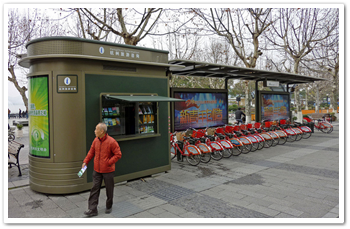With over 50,000 bikes available to rent, Hangzhou in China is aiming to reduce pollution, cut congestion, and keep its people healthy – all while making a profit! By Jeremy Torr.
 Just a dozen of the 50, 000 city rental bikes in Hangzhou, China.
Just a dozen of the 50, 000 city rental bikes in Hangzhou, China.
Hangzhou, China 2 July 2011. If you thought Paris had a lot of city rental bikes at 20,000, think again. The city of Hangzhou in China beats that hands down with 50,000 – and that makes it the biggest city bike hire system in the world. But typically of Chinese vision, that’s just the start. The plan is to expand to 175,000 bikes by 2020.
Hangzhou’s riders make an average of 240,000 trips every day, which is pretty impressive. According to Bike-Sharing blog, Lu Zhihong, Deputy General Manager, Hangzhou Public Transport Corporation says that public bicycle outlets will become as popular as public telephone booths along city streets. “In the future, residents will largely ride bicycles to go shopping in food markets and supermarkets, or to go to the office,” he says.
The city elders decided to implement the system – and make it easy and attractive – after realising that the national move to car ownership and usage was clogging up the roads, destroying the purity of the air and even more importantly to the world’s manufacturing engine, making people late for work.
 There are more than 2,000 bike-share stations in Hangzhou
There are more than 2,000 bike-share stations in Hangzhou
The Hangzhou Public Bicycle Service (HPBS) system’s popularity and success have set a new standard for bike-sharing in Asia. There are more than 2,000 bike-share stations that are dotted about the city, and the scheme that started in May 2008 has around 30,000 individual rentals on a typical day and is underwritten by the local government to keep costs low and locals pedaling. To rent a bike, people simple swipe their ID card and pay 200 Yuan as a deposit. After that, the service is free for the first hour, and then riders pay one yuan ($.30) for up to two hours. They can keep the bike out for up to 24 hours, but that costs three yuan per hour so the accent is on short trips.
And it’s working. Earlier this year, HPBS claimed each bike was used an average of 5 times each day by different riders. Additionally, in contrast with many European bike-share systems, HPBS has embedded a paypoint directly into the bikes. This makes it easier for a user to end a rental by slotting a bike into a bike rack, swiping their local transport card over the bike itself, and walking away.
This, says HPBS, reduces time to check the bike in from about five minutes to just one minute, something riders in London, Barcelona and Paris will appreciate. The system is currently not turning a profit, but the local government hopes to turn that round with the provision of advertisements on the bikes and at bike return spots.  To rent a bike, people simple swipe their ID card and pay 200 Yuan as a deposit.
To rent a bike, people simple swipe their ID card and pay 200 Yuan as a deposit.
And what about “losses”? According to HPBS, not a single bike was stolen in the service’s first year of operation, and very few have been damaged or vandalised. In contrast, London’s Boris Bikes suffered from six docking stations being hit by motor vehicles and six more vandalised in the first six months with up to third of the fleet needing some kind of refurbishment or repair. Likewise Paris’s Velib bike-share program has reported that almost half of the original Velibs were stolen, or damaged. So much for the French being bicycle lovers!
Photos: Web Sources
For a great video of the system see: